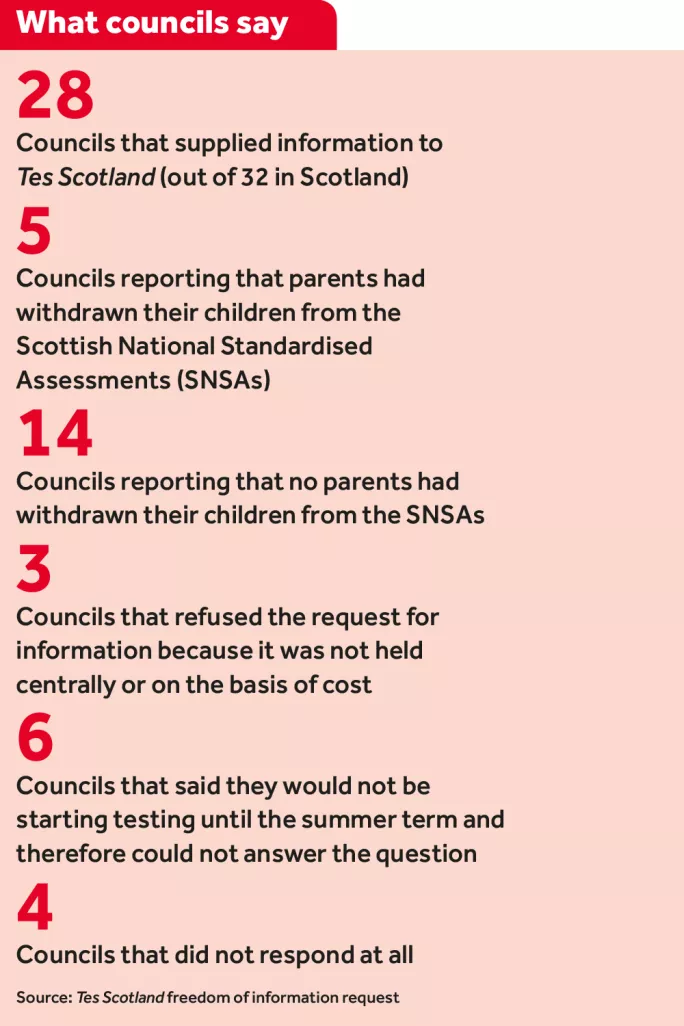Handful opt out of national tests

Only a handful of parents have withdrawn their children from sitting the Scottish government’s controversial new national tests in literacy and numeracy, an investigation by Tes Scotland reveals.
In a response to a freedom of information request, answered by 28 of Scotland’s 32 local authorities, only five councils - Argyll and Bute, East Dunbartonshire, East Renfrewshire, North Lanarkshire, and Perth and Kinross - report that any children have been withdrawn from sitting the Scottish National Standardised Assessments (SNSAs).
All five councils say that the total number of children who opted out was fewer than five. In North Lanarkshire, just one parent requested that their child should not sit the exams.
The most controversial tests are those being delivered in P1, but no authority reported a P1 child being withdrawn.
Campaign to scrap assessments
The new literacy and numeracy assessments were introduced into schools for the first time this year in P1, P4, P7 and S3, and the government is expected to introduce Gaelic-medium assessments in August. However, teaching organisations and parental groups are yet to be convinced of the efficacy of the tests.
Recently, an influential group made up of hundreds of teachers and headteachers, as well as other education and early years experts - backed by the EIS teaching union - began a campaign to scrap the assessments in P1. And last week, Tes Scotland exclusively featured the most comprehensive feedback to date about schools’ experiences of setting the tests, with staff warning that they were a drain on teachers’ time and that P1 pupils had become upset (“P1 children ‘in tears’ over new national assessment”, 25 May).
Eileen Prior, executive director of parents’ organisation Connect, says pupils are not being opted out of the tests because parents think they are “mandatory”. She is calling on schools to make it clearer that parents have the right to withdraw their children.
Prior says: “We have heard from teachers that the word ‘mandatory’ is being bandied about in relation to these tests. We are putting the word out that parents do have the authority to withdraw their children from these tests, but the reality is most parents get their information from their child’s school.
“Schools need to talk to parents about what’s going on and make it clear they have the right to say no.”
‘Undermining’ the programme
Even when parents are aware of their right to opt out and try to exercise it, they are often discouraged, says Prior. A Scottish government response to a letter asking if parents can withdraw their children from the P1 tests makes it clear that they are “not compulsory”. However, it goes on to say that assessment is “a central part of everyday learning and teaching” and “there is no benefit to opting out for parents or for children”.
Prior adds: “Parents who want to withdraw their children are being made to feel like they are overreacting and there are no benefits, but that depends. If you know you have got an anxious child or if your child does not have English as their first language, there is a benefit - they will not have the stress of sitting the test.”
EIS general secretary Larry Flanagan says that while his union is yet to be convinced of the value of the tests, any school promoting the facility to opt out to parents could be accused of “undermining” the government’s SNSA programme.
“If an opt-out is something parental bodies have agreed with the Scottish government, then schools need to be told to actively promote it,” he says. “The people working in schools are employed by local authorities, and councils are funded by the Scottish government - they can’t actively seek to undermine what is an agreed national programme.”
A Scottish government spokesman says: “The national standardised assessments are just one source of information available to teachers to help tailor teaching and learning, and inform professional judgement of children’s progress. These are not ‘high-stakes’ assessments, there is no pass or fail, and children do not have to revise for them.”
He adds: “Teachers have complete flexibility over how and when they are delivered, and they should be conducted as a part of everyday learning and teaching. Parents should talk to their child’s school if they have any queries about them undertaking an assessment.
“From the feedback we have already received, where teachers are using the assessments as part of everyday learning and teaching, children have found them interesting and easy to use.”
In evidence to the Scottish Parliament’s Education and Skills Committee last week, education secretary John Swinney addressed concerns that the P1 national assessments were a waste of time and particularly damaging for disadvantaged children. He said he had received some feedback about the P1 assessments but had not been “inundated”.
Swinney added that the P1 tests should be done in a “very relaxed environment within the classroom” and should not take more than 40 minutes. “The P1 assessment, if properly handled, will be a pretty straightforward experience for a child,” he said.

You need a Tes subscription to read this article
Subscribe now to read this article and get other subscriber-only content:
- Unlimited access to all Tes magazine content
- Exclusive subscriber-only stories
- Award-winning email newsletters
Already a subscriber? Log in
You need a subscription to read this article
Subscribe now to read this article and get other subscriber-only content, including:
- Unlimited access to all Tes magazine content
- Exclusive subscriber-only stories
- Award-winning email newsletters